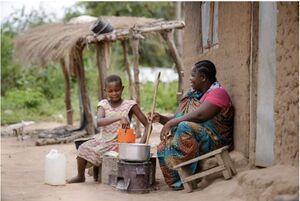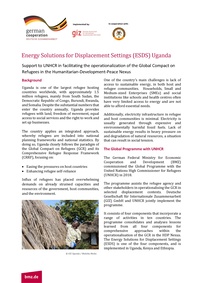ESDS Country Portrait Uganda - Factsheet
Background
Uganda is one of the largest refugee hosting countries worldwide, with approximately 1.4 million refugees, mainly from South Sudan, the Democratic Republic of Congo (DRC), Rwanda, Somalia, and Burundi. Despite the substantial number of refugees, Uganda provides refugees with land, freedom of movement, equal access to social services and the right to work and set up businesses. Uganda is applying an integrated approach, whereby refugees are included into the national planning framework and national statistics. By doing so, Uganda closely follows the paradigm of the Global Compact on Refugees (GCR), the adoption of the New York Declaration and its Comprehensive Refugee Response Framework (CRRF) and especially focuses on:- Easing the pressures on host countries
- Enhancing refugee self-reliance
The influx of refugees has placed overwhelming demands on already strained capacities and resources of the government, the host communities, and the environment. Lack of access to sustainable energy is one of the great challenges that Uganda faces these days, in both host as well as refugee communities. Households, small and medium-sized enterprises (SMEs) and social institutions like schools and health centres often have very limited access to energy and are not able to cover essential needs. Moreover, electricity infrastructure in refugee and host communities is minimal and usually generated through expensive and environmentally harmful fossil fuels. Lack of sustainable energy results in heavy pressure on and degradation of natural resources that can result in social tension.
| Name | Energy Solutions for Displacement Settings (ESDS) |
| Commissioner | German Federal Ministry for Economic Cooperation and Development (BMZ) |
| Partners | Ugandan Ministry of Energy and Mineral Development (MEMD) and UNHCR |
| Duration | 08/2019 – 12/2022 |
Project Information
The project Energy Solutions for Displacement Settings (ESDS) Uganda seeks to address the lack of sustainable energy supply in refugee hosting areas through advisory services and the implementation of measures in three main areas.
1. Improving the Enabling Environment for Sustainable Access to Energy
The project provides advisory services to MEMD and UNHCR concerning strategic energy planning and promoting the inclusion of refugees into national service delivery systems. For example, GIZ supported the development of the Sustainable Energy Response Plan (SERP) in line with the National Plan of Action to implement the GCR and its CRRF. ESDS supported the establishment of the respective task force within MEMD and in cooperation with UNHCR, the Office of the Prime Minister, the CRRF Secretariat, the Rural Electrification Agency and World Bank.
2. Greening UNHCR Infrastructure
ESDS Uganda develops market-based approaches for the replacement of diesel generators to power offices and base camps with cost-efficient renewable energy. ESDS conducts energy assessments and develops guidelines and project proposals for UNHCR to implement solar-hybrid systems based on private sector energy delivery models.
3. Sustainable Energy Access for Households, Social Institutions, and SMEs
ESDS pilots and promotes market-based solutions for access to sustainable cooking energy and electricity for households, social institutions and small businesses, benefitting both refugees and host communities. This involves stimulating demand through awareness raising campaigns and product marketing, developing financing schemes for end users and de-risking private sector involvement in the spirit of the GCR. ESDS establishes solar-powered Energy Kiosks with local entrepreneurs to offer phone charging, secretarial services as well as improved cook stoves and quality solar products. The project supports the solarisation of social institutions like health centres which provide isolation units as part of the COVID-19 response.
The factsheet can be downloaded here:
Partners
GIZ's Energy Solutions for Displacement Settings (ESDS) project cooperate with UNHCR to enhance the access to sustainable energy in displacement contexts, and the Energypedia page has been created to share learnings across various practitioners to spur the development of clean energy solutions.






















